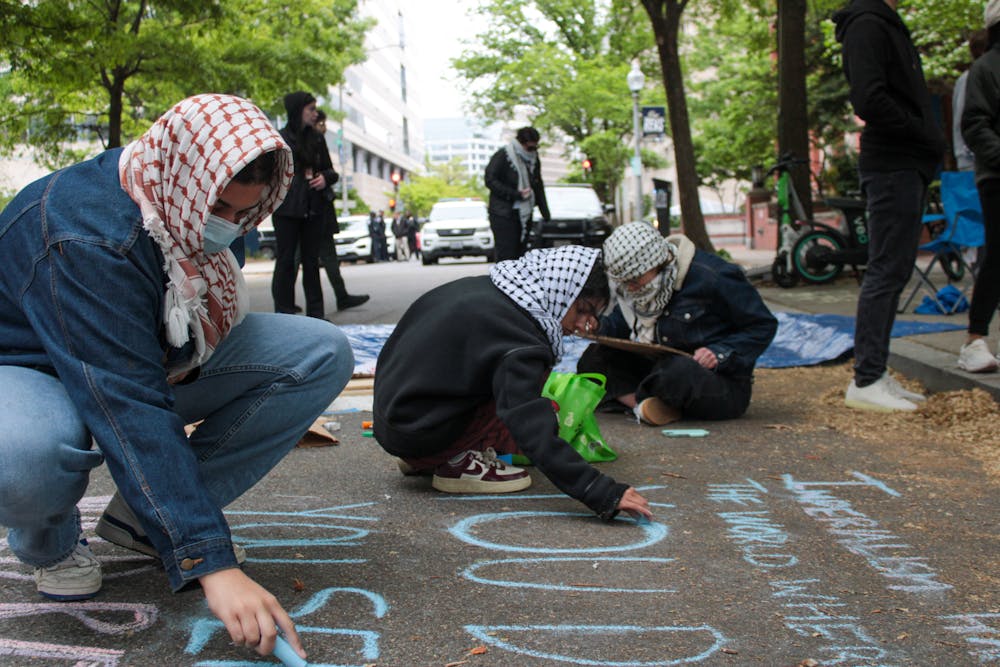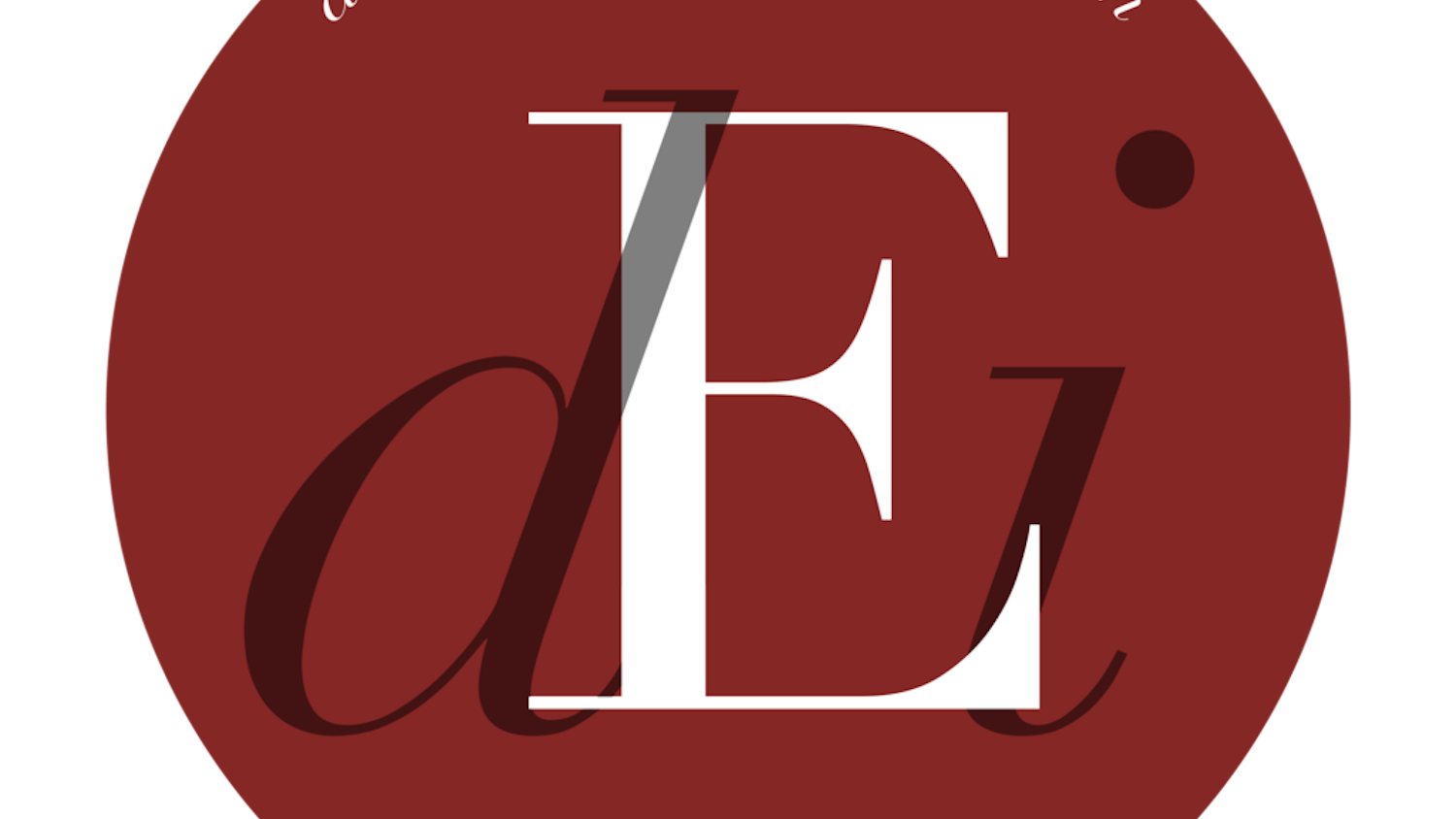As chanting and singing continued late into Friday night, demonstrators at George Washington University began setting up tents on H Street next to University Yard around 11:20 p.m., expanding the encampment set up Thursday.
The original encampment has remained barricaded since early Friday morning with no one new allowed in. Metropolitan Police Department vehicles continue to block off the section of H Street in front of University Yard between 20th and 21st Streets.
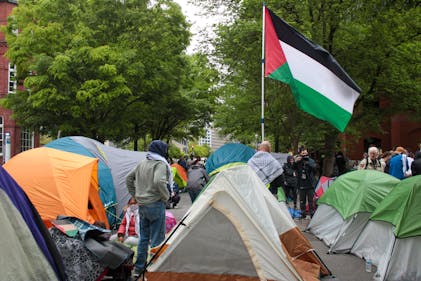
As students woke up and prepared for another day of encampment, organizers offered free food, water and coffee to students, and reminded participants to keep the encampment – both in the University Yard and on the street – clean throughout the day.
Members of the encampment held a press conference around 1:40 p.m. to discuss their experiences and confrontations with the university. Yesterday evening, organizers announced the suspension of seven students who participated in the encampment.
Those hosting the press conference introduced themselves as representatives for Students for Justice in Palestine across GW, American University, Georgetown University, George Mason University, Howard University, Gallaudet University, University of Maryland and University of Maryland, Baltimore County.
The representatives said they were determined to maintain the encampment and clarified their demands: for Pro-Palestinian organizers and organizations to be protected, the universities to divest from companies with ties to Israel, for all endowments and investments to be disclosed and a stop to academic partnerships with Israel.
Representatives also explained that as of this morning, the GW Police Department tightened the barricade around the encampment, cutting off their access to indoor bathrooms. They are concerned for their health because they said that GW Police and the GW administration have not allowed medics and legal observers to enter the barricade.
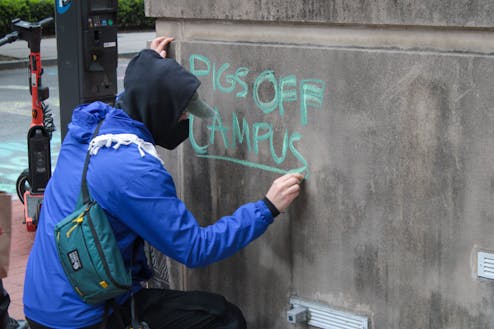
Representatives did not disclose the number of students who remain in the encampment when asked at the press conference. They also refrained from disclosing the current locations and identities of the seven suspended students, but said they are facing nine charges and were evicted from their dorms as of 9 a.m. this morning, when their suspensions went into place.
According to the representatives, the GW president, Ellen M. Granberg, has been the only GW administrator who has not visited the encampment. They also said that some local Democratic politicians have expressed interest in their demonstration but no one has stopped by.
The press conference also addressed the presence of GW Police and MPD around the encampment and said they have asked GW administration to have them withdraw.
Finally, representatives urged supporters to continue showing up to their demonstration and putting pressure on the administration. They thanked the community for continued messages — including international messages — of support.
Not everyone present at the encampment was involved with its planning nor did everyone spend the night. Many community members and others affiliated with various universities have stopped by University Yard to express solidarity with the demonstrators.
Sage Collis, a freshman in the AU School of Public Affairs, said she came to show support for GW students and to express her views on GW administration’s response to these demonstrations.
Collis appreciated that there were many other AU students at the protest.
“It’s definitely not just GW kids [protesting]; it’s people from all over the DMV,” she said.
At 4 p.m., DMV Students for Justice in Palestine and associated accounts posted on Instagram demands for other universities in the DMV, including AU. Each school had separate and specific demands within the post. For AU, the demands echoed that of AU SJP’s earlier calls: the end of student exchange programs with Israel, financial transparency in terms of investments and endowments, refusal of donations from entities that support Israel and the reversal of AU SJP’s disciplinary probation.
Students, professors and other community members from surrounding D.C., Maryland and Virginia universities continued to show up throughout the day to show their support for students in the encampment and to draw attention to SJP’s demands.
Mark Lance, a philosophy professor at Georgetown, said everyone in and outside the encampment has a responsibility to recognize the dedication of the students protesting.
“Whether you’re paying attention to the atrocities that are happening or not, they are happening, and know that there are hundreds of brave young people who are risking their future and their education,” Lance said.
Charlotte Richardson-Deppe, a lecturer in the Art Department at the University of Maryland College Park, started an impromptu sew-in by laying out letters on a protest banner. Others joined in and helped sew the letters to spell out “Free Palestine” and “Ceasefire Now.” She said she came to “stand in solidarity with Gaza and protest the atrocities that are being committed and the genocide that is being committed there.”
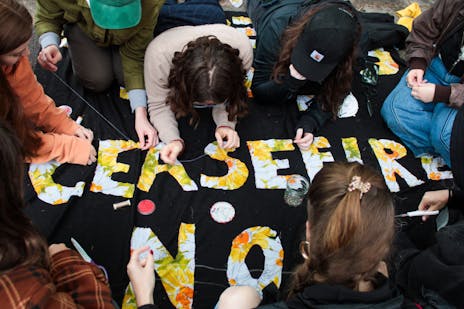
“As a professor, I feel really compelled to protect and advocate for student activists who are out here, bravely and peacefully exercising their right to protest,” Richardson-Deppe said. “I’m a fiber artist and a textile artist and when I feel really useless, I can offer sewing. So this is a protest banner sew-in, where it’s like a sit-in, but it’s a sew-in, and I think giving people something that they can do that helps is really, really powerful in the face of such terrible things.”
Lois Wessel, an associate professor in the Georgetown School of Nursing and School of Medicine, used her quilting skills to help sew letters on the banner. She said she came to show students support from Georgetown faculty and “to bring light to the fact that there’s genocide going on in Palestine.”
“As the child of somebody who fled Nazi Germany, I feel like it’s my responsibility to raise a voice that says that not all Jewish people support the State of Israel and that what’s going on in Palestine is akin to what the Nazis were doing to the Jews and that needs to be said by everybody, but I think there’s a certain level of, a certain weight, when it’s said by somebody who’s Jewish,” Wessel said.
Cole Shacochis-Edwards, the parent of a student at UMD, came from Baltimore early Saturday morning to join the demonstration and expressed her concerns for the safety of the protesters.
“As a parent, this is really important to me. I wanted to see for myself that students are safe and that the administration and the D.C. police are operating within the law,” she said.
Nick and Laura Ungar, both Jewish D.C. residents, wore shirts to the encampment with the phrase “Not in our name,” which has become a popular call amongst some Jewish Americans who disagree with U.S. support of Israel.
“For the first time in our lifetimes, [students] are breaking through on caring about what happens to the people in Palestine,” Nick said. “This was super fringe until six months ago and now the whole world is talking about it and these [students] did that.”
Tyler Healey came with Feds United for Peace, a group of federal government workers who have publicly supported the encampments on college campuses happening across the country. He said the group is “appalled” by what’s going on in Palestine, adding that “it’s just stunning that [President Joe Biden] is enabling this and supporting it.” He said he’d seen posts about encampments on social media, and hopes that organizers across universities can coordinate together.
“I just hope it keeps growing and growing,” Healey said. “And I’d love for them to eventually get in contact with each other and then come to D.C. and shut things down, not just rally and then leave at the end of the day. … You have to find leverage, you have to find power against the power of the ruling class. And I think they’ll know all that stuff, so I’m optimistic.”
Kai Blevins, a PhD student at GW, said they also hope people will continue coming to the encampment to show their support, no matter their differing beliefs.
“I don’t think you have to have the same politics as everybody in order to be here,” Blevins said. “There’s a genocide happening, and it needs to end and the U.S.’ contribution to that genocide need to end.”
Kathy Boylan, a D.C. resident for over 30 years, said she has been advocating against war since 1968, when she protested the Vietnam War. She expressed that advocacy can be difficult and scary, but must happen in order to enact change.
In reference to tax dollars, Boylan said, “My point is that we are funding the genocide going on right now.”
“It’s not good enough to look at the Capitol and say to the Congress people and the senators, ‘Stop funding genocide,’ when we’ve given them the money to fund the genocide,” she said. “We also have to say to ourselves to stop funding them.”
Daniel Ingram is a 93-year-old D.C. resident and married to Marione Ingram, an 88-year-old Holocaust and 1943 Allied bombing of Hamburg survivor. Marione is also the author of “The Hands of War,” a book “used by American University as the main vehicle for the Department of English Creative Nonfiction year after year after year,” Daniel said.
The couple has attended pro-Palestinian vigils outside of the White House every day for the past six months to express solidarity with the Palestinian movement.
Daniel said protests in D.C. are the “center of things” and those at AU are a “bastion of education and enlightenment.” He added that he wants to be more aware of the “dangers the world is in,” and to see an end to the killings in the Middle East.
“I am 93 years old,” Daniel said. “[Marione] is 88. [Young people are] in grave danger, and there’s a lack of sufficient awareness of the dangers and the consequences of continuing to pursue bombing and violence.”
Daniel recognizes the burden young generations have to face, calling it the “greatest task” any generation has ever faced. Naming nuclear bombing, rising fascism, widespread war, mass killing and a lack of awareness, Daniel said he and Marione hoped to show the dangers of these tragedies.
“Frankly, it’s really an impossible task, but you have to succeed,” Daniel said. “You have to stop the killing. I wish you love in all of this. I am sorry that it is this way.”
Mackenzie Konjoyan contributed reporting.
This article was edited by Abigail Hatting, Zoe Bell, Tyler Davis and Abigail Turner. Copy editing done by Luna Jinks and Sarah Clayton.

